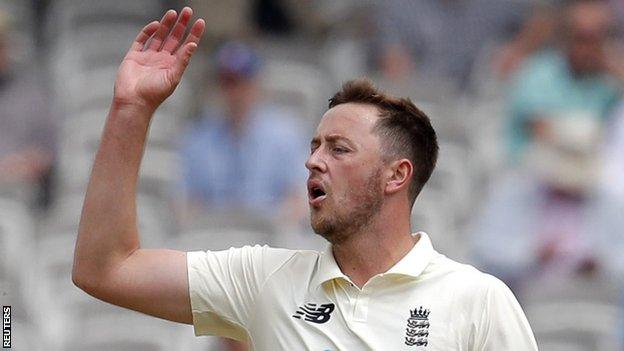England bowler Ollie Robinson suspended for eight matches for past racist and sexist tweets
- Published

Robinson returned match figures of 7-101 and scored 42 in his only innings against New Zealand
England fast bowler Ollie Robinson is free to play cricket again immediately despite being given an eight-match ban for historical racist and sexist tweets.
Five games of the ban are suspended for two years and three have already been served, after he missed the second Test against New Zealand and two T20 Blast matches for Sussex Sharks.
The 27-year-old's posts from 2012 and 2013 came to light while he was making his England debut in the drawn first Test against the Kiwis in June.
The decision was made by the Cricket Discipline Commission (CDC), an independent panel that adjudicated on the England and Wales Cricket Board's (ECB) rules and also fined Robinson £3,200.
"I fully accept the CDC's decision," said Robinson. "As I have said previously, I am incredibly embarrassed and ashamed about the tweets I posted many years ago and apologise unreservedly for their contents.
"I am deeply sorry for the hurt I caused to anyone who read those tweets and in particular to those people to whom the messages caused offence. This has been the most difficult time in my professional career for both my family and myself.
"Whilst I want to move on, I do want to use my experience to help others in the future through working with the PCA [player's body the Professional Cricketers' Association]."
Robinson a 'very different person'
Following his suspension for the second Test against New Zealand, Robinson took a "short break" and returned to action towards the end of June when he played for Sussex Sharks in a T20 Blast game against Gloucestershire.
Prime Minister Boris Johnson said he was "supportive" of Culture Secretary Oliver Dowden saying the ECB had "gone over the top" in suspending him and should "think again".
However, former England batsman Mark Ramprakash said the Prime Minister's intervention was "unwelcome" and the he was "trying to bear undue influence in this case".
And Michael Carberry, who played six Tests for England between 2010 and 2014, told BBC Radio 5 Live that Robinson "wouldn't be playing Test cricket" if it was up to him, adding: "I don't believe this is a problem where you can rehabilitate someone."
In reaching its decision, the CDC said it took into account "the nature and content of the tweets, the breadth of their discrimination, their widespread dissemination in the media and the magnitude of the audience to whom they became available".
It added it also considered "significant mitigation, including the time that had elapsed since the tweets were posted" by Robinson when he was aged 18 and 19.
Robinson also chose to address the panel, which found him to be "a very different person to the one who sent the tweets" and the CDC "also took account of his remorse, admissions and cooperation as well as the huge impact which the revelation of these tweets and its consequences have had upon him and his family".
"Ollie has acknowledged that, whilst published a long time ago when he was a young man, these historic tweets were unacceptable," said ECB chief executive Tom Harrison.
"He has engaged fully in the disciplinary process, admitted the charges, has received his sanction from the CDC and will participate in training and use his experiences to help others.
"We stand against discrimination of all forms, and will continue working to ensure cricket is a welcoming and inclusive sport for all."
PCA chief executive Rob Lynch said the "learnings of the last month" would be used "to further develop and evolve our education programmes in social media" to build on an "ongoing commitment to equality, diversity and inclusion".
"[Robinson] has matured significantly as an individual since he posted these tweets and has made a firm commitment to continuing to improve," said Lynch.
"I am pleased Ollie has volunteered to work with the PCA to use this experience to try and positively influence other players in our game and in society."

'It's about doing the best you can each day': Life lessons from tennis legends
The young people being priced out: 'You could work hard for years and never afford anything'
